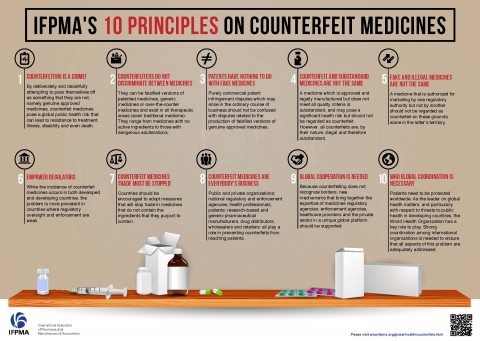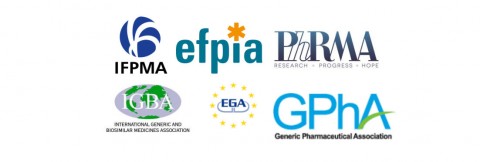Fight against Counterfeit Medicines to protect Patients’ Health
The International Federation of Pharmaceutical Manufacturers and Associations (IFPMA) today launched its Ten Principles on Counterfeit Medicines, to re-focus attention on this issue and underline the R&D-based pharmaceutical industry’s stance in the global fight against counterfeit medicines.
Mr Haruo Naito, President of the IFPMA, and President and CEO of Eisai, commented: “Counterfeit medicines are a crime, and our industry is serious about tackling this problem head on. These criminals pose a threat to global public health: deliberately and deceitfully they attempt to pass off their dangerous products as legitimate medicines, and risk patients’ lives in order to make illegal profits. This is not about commercial interest; this is about protecting patients, and we stand ready to be an active partner in WHO-led efforts, including IMPACT 1 .”
Data gathered by the industry’s Pharmaceutical Security Institute (PSI) shows that the scope of the problem and the number of incidents is on the rise. Speaking in support of the IFPMA Principles, Mr. Thomas T. Kubic, CEO of PSI, said: “Based on our research, the number of counterfeit medicine incidents worldwide rose almost seven percent last year, to 1,693. Of particular concern has been the growth in counterfeit anti-infectives. In 2009, incidents involving counterfeit anti- infectives increased by almost 50% over the previous year. Anti-infectives, which include anti- malarials, are the therapeutic category most affected by counterfeiting incidents in Africa. Moreover, criminal gangs engaged in the manufacture, distribution and sale of counterfeit medicines are now copying other life-saving treatments including cancer therapies and heart disease medicines.”
Despite counterfeiting being identified as a public health threat by many governments, there is still lack of awareness among policy makers and the general public about the real consequences of this criminal activity and the scope of action that is needed. Developing countries are particularly at risk, given their varying degrees of awareness and limited resources for effective enforcement.
Eduardo Pisani, Director General of the IFPMA, commented: “We hope that the Ten Principles will highlight the full scope of the problem and demonstrate that the fight against counterfeit medicines is simply about protecting patients’ health. The IFPMA calls on all stakeholders, including governments, health care providers, patients, the private sector and the WHO, to take collaborative action and create a global policy environment that recognizes, prioritizes and effectively addresses this major threat to global health.”
Geneva, 12 May 2010













